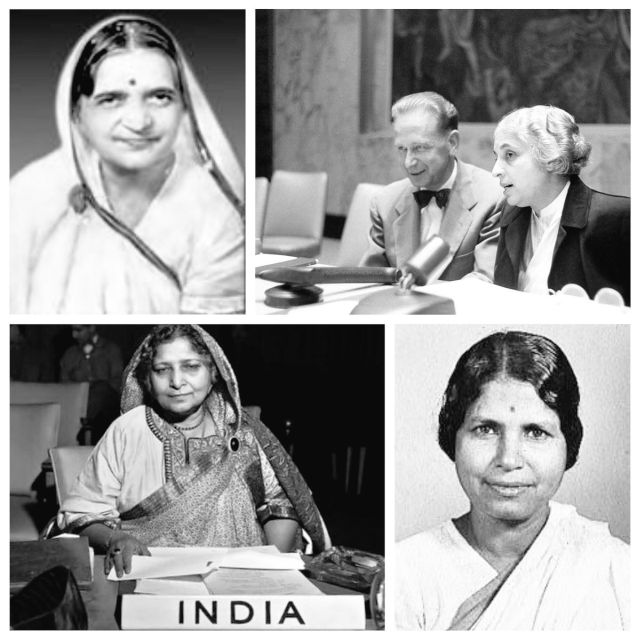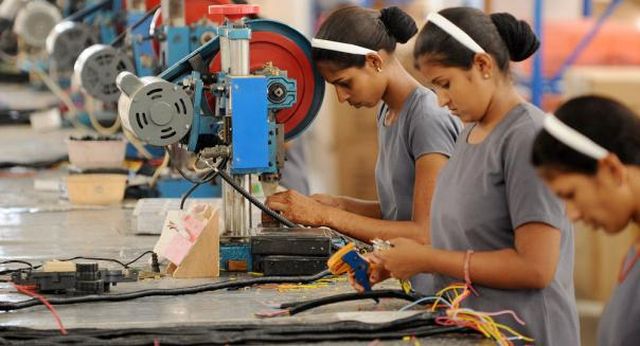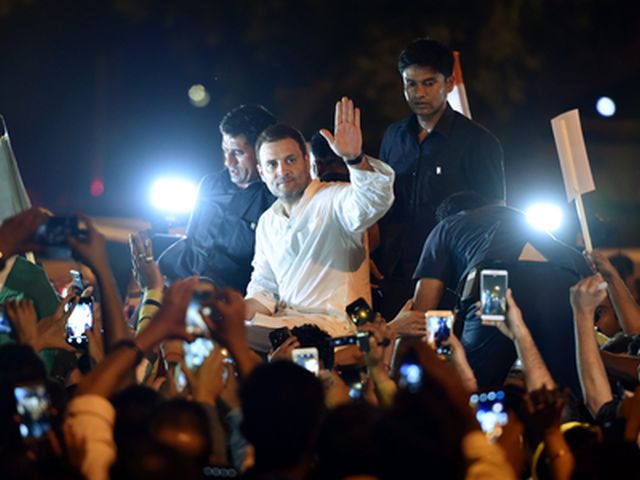
by admin | May 25, 2021 | Entrepreneurship, News, Politics, Women Entrepreneur

Hansa Mehta, Lakshmi Menon, Begum Hamid Ali and Vijayalakshmi Pandit
By Arul Louis,
United Nations : Four Indian women pioneers at the UN — Hansa Mehta, Lakshmi Menon, Begum Hamid Ali and Vijayalakshmi Pandit — were hailed on Tuesday as role models who worked to champion gender equality at a nascent world organisation.
At a panel discussion here on the Southern Legacy of Women and the Origins of the UN, Rebecca Adami, a senior lecturer at the University of Stockholm, said the push for gender equality came not from Western nations, but from the countries of the South.
She credited Hansa Jivraj Mehta with ensuring the inclusion of women in the UN’s Universal Declaration of Human Rights (UDHR), which in its initial draft spoke only of the rights of the “man” and Eleanor Roosevelt, the champion of human rights from the US, who chaired the drafting committee was oblivious to the omission of women.
“Hansa Mehta, the only female on the Commission on Human Rights besides Eleanor Roosevelt, objects to the use of ‘man’ in the draft arguing that member states can use this to restrict the rights, rather than expand them since women are not considered necessarily included in that wording,” Adami said.
As a result of Mehta’s persistence, the draft was amended to mention “human persons” and “equality of men and women” in the UDHR adopted in 1948.
Adami said that Begum Hamid Ali, the Indian delegate to the UN Commission on the Status of Women in 1947, championed the inclusion of women, whom she had described as the “immense source of wealth lying at the thresholds unused”.
India’s Permanent Representative Syed Akbaruddin said that the Indian women pioneers “served as bridges between the processes of global norm-building at the UN and the institution building processes at the national level” in India.
Mehta was also a member of the Constituent Assembly and the Indian Constitution draws upon several aspects of both the UN Charter and the UDHR, he said.
“The themes of equality, freedom, justice, peace and respect for international law resonated throughout the Indian Constitution that was worked upon around the time that the theme of Human Rights was resonating universally, he said.
Lakshmi Menon, who headed the Commission on Status of Women during 1949-50, “was an outspoken advocate of the ‘universality’ of human rights,” he said.
She, “along with her colleagues from other developing countries, strongly opposed the concept of ‘colonial relativism’, which sought to deny human rights to people in countries under colonial rule,” he added.
Akbaruddin drew attention to the stark contrast between the developing and developed countries in promoting women to positions of authority at the UN.
“While the global North tries to position itself as a leader of gender equality, there have been only three women who have served as the President of the General Assembly – all three have been from the global South,” he said.
The first was Vijayalakshmi Pandit in 1953 and she was followed by Angie Elizabeth Brooks of Liberia in 1969 and Haya Rashed Al-Khalifa of Bahrain in 2006.
(Arul Louis can be reached at arul.l@ians.in)
—IANS

by admin | May 25, 2021 | News, Politics
 New Delhi : The Union Cabinet on Saturday approved an ordinance that provides for death penalty to those convicted of raping a child below the age of 12 and life term for raping a girl below age of 16.
New Delhi : The Union Cabinet on Saturday approved an ordinance that provides for death penalty to those convicted of raping a child below the age of 12 and life term for raping a girl below age of 16.
The Criminal Law (Amendment) Ordinance, 2018, approved at cabinet meeting presided over by Prime Minister Narendra Modi, seeks to provide effective deterrence against rape and instill a sense of security among women, particularly young girls in the country.
The government also decided to put in place a number of measures for speedy investigation and trial of rape cases including a two month time limit for investigation, two months for completion of trial and six months for disposal of appeals.
There will be no provision for anticipatory bail for a person accused of rape or gang rape of a girl under 16 years.
The Cabinet also decided to strengthen investigation and prosecution including setting up fast track courts, and special forensic labs in each state besides maintaining a national database of sexual offenders.
The ordinance came in the wake of a nation-wide outrage over rape and murder of an eight-year-old girl in Kathua in Jammu and Kashmir, and other instances in different parts of the country including rape of a nine-year-old girl in Surat.
Sources said the government has taken a serious note of the rape incidents in the country and has decided on a comprehensive response to deal with the situation, with the ordinance approved in view of urgency and seriousness of the issue.
The ordinance seeks to amend the Protection of Children from Sexual Offences (Pocso) Act by stringent provisions in case of rape of children and minors.
It provides that punishment for rape of a girl under 12 years will be minimum 20 years imprisonment or imprisonment for rest of life or with death.
Punishment for gang rape of a girl under 16 years of age will invariably be imprisonment for rest of life of the convict.
In case of gang rape of a girl below 12 years, punishment will be imprisonment for rest of life or death sentence.
The minimum punishment in case of rape of women has been increased from rigorous imprisonment of seven years to 10 years, extendable to life imprisonment.
In case of rape of a girl under 16 years, minimum punishment has been increased from 10 years to 20 years, extendable to imprisonment for rest of life, which shall mean imprisonment till that person’s natural life.
The ordinance also provides that court has to give notice of 15 days to Public Prosecutor and the representative of the victim before deciding bail applications in case of rape of a girl under 16 years of age.
The Cabinet also approved a number of important measures in order to give effect to the legal provisions and to improve the capacity of criminal justice system to deal with rape cases.
As part of strengthening the courts and prosecution, new Fast Track Courts will be set up in consultation with states and union territories and high courts. New posts of public prosecutors will be created besides setting up related infrastructure in consultation with the states.
There will be dedicated manpower for investigation of rape cases in a time-bound manner. Police Stations and hospitals will be provided with special forensic kits for rape cases.
Special forensic labs will be set up in each state and union territory to deal exclusively with rape cases.
The measures will form part of a new mission mode project to be launched within three months.
As part of measures to strengthen the national database, the National Crime Records Bureau will maintain a national database and profile of sexual offenders, and this will be regularly shared with states and union territories for tracking, monitoring and investigation, including verification of antecedents by police.
The present scheme of One Stop Centres for assistance to victim to be extended to all districts in the country.
—IANS

by admin | May 25, 2021 | Business Ideas, Economy, Entrepreneurship, Markets, News, Women Entrepreneur
 By Arul Louis,
By Arul Louis,
United Nations : India must focus as a priority on ensuring that more women work in the formal sector as it continues with labour reforms, according to Ken Kang, the deputy director in International Monetary Fund (IMF) Asia Pacific Department.
While “in recent years India has made very impressive progress in reforms,” he said that “looking ahead there are important policy priorities” and listed three among them.
“One, is to continue improvements in product and labour market reforms with a focus on increasing formal female labour participation to improve the business environment, and reduce complex regulations, but also to address supply bottlenecks, particularly in the agricultural sector and distribution networks,” Kang said at a news conference on Friday in Washington.
As one of India’s major reform achievements, he mentioned the “introduction of flexible inflation targeting and of a statutory monetary policy which has helped to strengthen the monetary policy framework.”
The Reserve Bank of India Act was amended in 2016, to provide for a Monetary Policy Committee that decides on the interest rate required for achieving the inflation target set by the government in consultation with the bank.
The other achievements include the Goods and Services Tax (GST) and the “major recapitalisation plan for the public-sector banks in order to accelerate the work out of nonperforming loans, as well as made some important legal improvements through a new insolvency and bankruptcy law,” Kang said.
“We expect and hope that the reform momentum continues,” he added.
“We are not saying that India’s structural reform speed will slow down because of elections,” Changyong Rhee, the IMF director of the Asia Pacific Department said.
“What we are saying is that the growth momentum and the structural reform momentum should continue despite the election period. So there is something misquoted,” he added.
On Thursday, IMF Managing Director Christine Lagarde had said at a news conference on Thursday, according to the IMF transcript: “We have seen and we are seeing — I am not sure that we will be seeing in the next few months given the elections that are coming up — major reforms that we had recommended and advocated for a long time.”
(Arul Louis can be reached at arul.l@ians.in)
—IANS

by admin | May 25, 2021 | News, Politics
 New York : Sharply criticising Prime Minister Narendra’s silence over rape cases in India, the New York Times in an editorial on Tuesday said such and other violent incidents were part of “an organized and systematic campaign by nationalist forces” to terrorise women, Muslims and Dalits in the country.
New York : Sharply criticising Prime Minister Narendra’s silence over rape cases in India, the New York Times in an editorial on Tuesday said such and other violent incidents were part of “an organized and systematic campaign by nationalist forces” to terrorise women, Muslims and Dalits in the country.
The editorial titled “Silence as Women Are Attacked” appeared on in the New York edition of the daily, reminding how Modi tweets “frequently and considers himself a talented orator”.
“Yet he loses his voice when it comes to speaking out about the dangers faced by women and minorities who are frequent targets of the nationalist and communal forces that are part of the base of his Bharatiya Janata Party (BJP,” said the Times.
It recalled how on Friday, Modi said the rape cases had brought shame on the country and that “our daughters will definitely get justice”.
“But his remarks ring hollow because he waited so long to talk about the cases and spoke in broad generalities — describing the crimes as ‘incidents being discussed since past two days’.”
The daily accused the Prime Minister of taking a similar approach in the past when addressing cases in which vigilante groups affiliated with his political movement attacked and killed Muslims and Dalits, falsely accused of killing cows.
There was a widespread public outrage as people across the country protested against rape and murder of an 8-year-old girl in January in Jammu and Kashmir and rape of a teenager in Uttar Pradesh.
The Prime Minister, however, has not directly spoken about the crimes and other cases involving supporters of the BJP.
Modi has also not talked about a rape accusation against a ruling BJP lawmaker in Uttar Pradesh.
“Modi’s silence is as perplexing as it is distressing,” the Times said, adding he seemed to have failed to learn the lesson of the Congress that did not forcefully respond to protests in late 2012 and early 2013 after a young woman was raped and killed on a public bus in New Delhi.
“The BJP won the elections in large part because Modi promised to make the government more responsive to the needs of Indians who were left behind by a government dogged by corruption scandals and widely considered rudderless.
“Instead, he has exhibited a pattern of silence and deflection that is deeply worrying to anybody who cares about the health of the world’s largest democracy.”
The Times editorial said Modi could not be expected to discuss every crime committed by someone who supports him.
“But these cases are not isolated or random examples of violence. They are part of an organized and systematic campaign by nationalist forces that want to terrorise women, Muslims, Dalits and other underprivileged citizens.
“The Prime Minister has a duty to safeguard and fight for all of the people of India, not just those who are allied with him politically.”
—IANS

by admin | May 25, 2021 | News, Politics
 New Delhi : Congress President Rahul Gandhi led a midnight protest by the party workers at India Gate here against the “slumber” of Narendra Modi government over the rape incidents in Jammu and Kashmir’s Kathua and Uttar Pradesh’s Unnao and to seek justice for the victims.
New Delhi : Congress President Rahul Gandhi led a midnight protest by the party workers at India Gate here against the “slumber” of Narendra Modi government over the rape incidents in Jammu and Kashmir’s Kathua and Uttar Pradesh’s Unnao and to seek justice for the victims.
The candle-light protest on Thursday midnight was called at a short notice and saw people converging at the India Gate in sizeable numbers to express their support.
Congress leaders including Ahmed Patel, Ghulam Nabi Azad, Ambika Soni, Ashok Gehlot, Randeep Singh Surjewala and Sushmita Dev walked from the party headquarters at 24 Akbar Road to the India Gate along with hundreds of party workers holding candles.
Rahul Gandhi joined the protest around midnight. His sister Priyanka Gandhi Vadra and her husband Robert Vadra were also present, along with their daughter.
Similar protests had been held at India Gate after the brutal gang-rape of 23-year-old paramedical student Nirbhaya in 2012. Nirbhaya’s parents were also present at the mid-night protest on Thursday night.
Congress workers tried to come near Rahul Gandhi, giving hard time to the Special Protection Group (SPG) men protecting him. Gandhi sat atop his vehicle to briefly talk to the media.
He said there were repeated incidents of violence, rape and murder of women in the country.
“We want the government to take action. Today, women are feeling insecure to move out of their houses. Somewhere a child, a woman is raped, killed and we want that the government should resolve this. The women of the country should feel safe,” he said.
Gandhi said it was a national issue and not a political issue.
“This is an issue concerning women,” he said, adding that people from all parties as well as the common man was at the India Gate.
“I only want to say that the atrocities being committed against women, the government should something about it.”
He said Modi’s slogan of “Beti Bachao, Beti Padhao” was a correct slogan. “We are saying that Narendra Modi should begin the task of protecting women of the country,” he said.
The Congress President had tweeted on late Thursday night about his intention to go on a candle march.
“Like millions of Indians, my heart hurts tonight. India simply cannot continue to treat its women the way it does.
“Join me in a silent, peaceful, candlelight vigil at India Gate at midnight tonight to protest this violence and demand justice,” he said.
The Bharatiya Janata Party (BJP) was apparently caught unawares about the protest, with Congress workers from Delhi and neighbouring areas rushing to the venue on the call of their party leader.
Congress leader Ghulam Nabi Azad said they were protesting to awaken the Modi government from its “slumber”.
Surjewala said the BJP-PDP government in Jammu and Kashmir failed to give justice to the minor girl raped in Kathua and the BJP government in Uttar Pradesh did not arrest a party legislator accused of rape of girl in Unnao.
The protest lasted nearly two hours. With the crowds making a rush towards Congress leaders, Priyanka Gandhi Vadra looked a bit miffed with their behaviour.
—IANS





